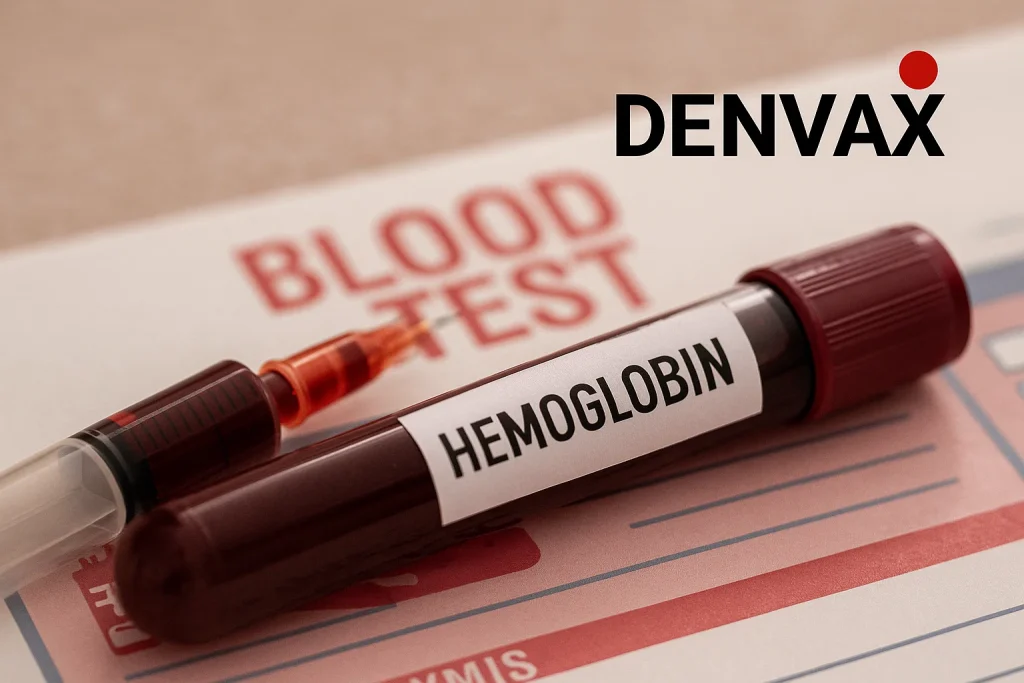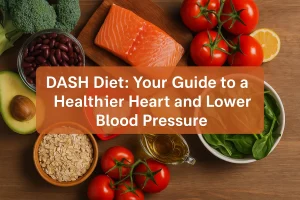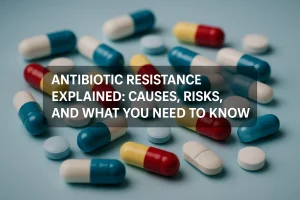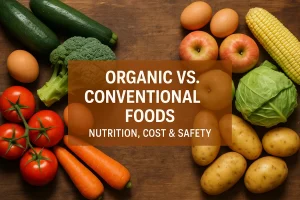
Low Hemoglobin? Causes, Symptoms & Diet Tips to Boost It Naturally
Hemoglobin is a protein of red blood cells essential for delivering oxygen throughout the body, which fuels your organs, muscles, and tissues. Understanding what constitutes a good haemoglobin level will help you remain on top of your health to prevent fatigue and maintain a strong immune system. In this blog, we’ll look at what healthy levels look like, why they’re important, and how to keep them with balanced nutrition and lifestyle choices.
Overview: What is Hemoglobin?
Haemoglobin is a protein found in red blood cells that carries oxygen throughout the body and brings carbon dioxide back to the lungs. Low haemoglobin indicates many blood-related diseases, such as anaemia, clotting disorders, etc., which, if not treated, can lead to many diseases. Therefore, the body needs adequate blood to function normally and keep you healthy and disease-free.
What are the normal haemoglobin levels in the body?
The normal range of haemoglobin in men is ~13.2-16.6 grams per deciliter (g/dL); in women, it should be around 11.6 – 15 grams per deciliter (g/dL). Levels lower than the normal range indicate serious health conditions such as anaemia, difficulty in breathing, and many diseases. In women, haemoglobin may decrease during menstruation or other physical conditions.
What are the symptoms of low haemoglobin levels?
Certain signs can indicate low levels. These are
- Fatigue and weakness
- Trouble breathing
- Dizziness
- Yellowing of skin
- Digestive issues
What Causes Low Hemoglobin Count?
Conditions that are associated with haemoglobin levels include.
Lifestyle and Environmental Factors –
- Poor diet—A diet deficient in iron, folate, and Vitamin B12 can affect RBC production, leading to a low level of haemoglobin.
- Blood Loss—In case of heavy Blood loss due to injury or trauma.
Medical Condition –
- Liver Cirrhosis—Damaged liver function affects nutrient absorption and RBC formation.
- Vitamin deficiency (B12, K)—Lack of these vitamins affects haemoglobin formation.
- AIDS- a decrease in Bone marrow activity due to suppressed immunity affects the blood count.
- Hypothyroidism- Affected metabolism and RBC production.
- Stomach ulcer—Ulcers can cause heavy bleeding, leading to chronic blood loss.
- Multiple myeloma- A type of cancer that affects bone marrow and RBC production.
- Thalassemia—A genetic condition that affects haemoglobin production.
- Lymphoma- Cancer of the lymphatic system—affects RBC formation.
- Sickle cell anaemia- An inherited disorder causes the RBC to become sickle-shaped and die.
What does a high level of haemoglobin indicate?
A high level in blood can be due to Lifestyle or medical conditions; these are:
Environmental/ Lifestyle factors –
- Dehydration- In case of extreme dehydration, the RBC concentrates raise the haemoglobin level.
- Smoking- Smoking can elevate the level of RBC due to an increase in carbon monoxide (CO) that affects the oxygen level in the body.
- Altitude- Due to low oxygen levels, the RBC naturally increases, which further increases the haemoglobin level.
Medical Condition –
- Lung or heart disease- Lung disease, such as COPD, or heart failure, the RBC level increases to compensate for the low oxygen level.
- Polycythemia vera- A rare blood disorder that causes bone marrow to produce excess RBC, leading to blood thickening and increased haemoglobin level.
- Sleep apnea- Can cause your breathing to stop, which leads to a sudden drop in oxygen level and an increase in RBC count.
What affects red blood cell production?
RBC count can be affected by:-
- Lymphoma- Lymphatic cancer that can migrate to the bone marrow and crowd out red blood cells.
- Leukaemia- A Blood and bone marrow cancer that inhibits red blood cell formation.
- Anaemia- Conditions such as aplastic or pernicious anaemia cause a reduction in red blood cells due to defective bone marrow or vitamin B12 deficiency.
- Multiple myeloma- It occurs when abnormal plasma cells in the bone marrow interfere with the development of red blood cells.
- Myelodysplastic Syndromes- Faulty blood stem cells do not grow into healthy red blood cells.
- Chronic kidney Dis e- can induce diminished hormone production, resulting in decreased red blood cell development.
- Antiretroviral medications- They can affect bone marrow and RBC production.
- Chemotherapy—During Cancer treatment, it can damage bone marrow, reducing red blood cell count.
Why should I be tested for haemoglobin?
You should be tested in case you have:-
- Symptoms of anaemia, weakness, dizziness, and fatigue.
- A family history of genetic conditions like sickle cell anaemia or thalassemia.
- A diet Low in iron and folate.
- Chronic or long-term infection.
- Excessive Blood loss due to trauma or injury.
Diagnosis and Test: What are the different haemoglobin tests?
A haemoglobin test is typically done in one of the following ways:
- Complete blood count(CBC) test- A Common routine blood test that measures the number of RBC, haemoglobin level, and hematocrit (blood coagulation), and examines all blood cells to assess haemoglobin count.
- Urine analysis– It’s not a direct test to examine haemoglobin levels, but rather used to check the presence of RBCs (hematuria), haemoglobin (hemoglobinuria) in the urine.
- Vitamin test – Checks for the essential vitamins, such as vitamin B9 or B12, which are important for forhaemoglobinn production and overall RBC health.
- HBA1C test- measures the average blood glucose level over 2-3 months and the percentage of haemoglobin attached to glucose.
Other Haemoglobin Tests
In case of any genetic or to analyse the variant of haemoglobin, some additional tests can be used; these include Haemoglobin Electrophoresis:
Separates various haemoglobin types based on their size and charge. It identifies types like HbA(adult haemoglobin), HbA2, HbF(fetal haemoglobin), and abnormal forms like HbS(sickle cell haemoglobin) to detect genetic disorders such as thalassemia and sickle cell disease. Haemoglobin in HPLC: A modern technique that accurately quantifies different haemoglobin variants like HBA, HbF.
Isoelectric Focusing: Separates haemoglobin based on isoelectric point for detailed analysis.
Non-invasive Screening: Estimates haemoglobin by using spectrophotometry does not require blood withdrawal.
How is a blood sample taken?
Different methods can collect a blood sample, most commonly include
- Fingerstick or Finger-prick test- A small prick is made in the thumb, and a drop of blood is collected.
- Venous blood test- Blood is drawn from a vein, typically in the lower arm, using a syringe or a vacuum tube.
Management Treatment: How to improve haemoglobin count naturally?
Lifestyle Factors
These daily habits and practices support healthy haemoglobin levels:
- Avoid Smoking- Smoking can interfere with oxygen delivery and may falsely elevate haemoglobin without improving oxygenation.
- Moderate Exercise- Do activities like walking, cycling, or yoga regularly to stimulate red blood cell production.
- Manage Stress- Chronic stress may suppress your body’s nutrient absorption and immune function.
- Drink plenty of water- Be hydrated as it improves overall blood volume and circulation.
- Routine Check-ups- Go for routine checkups in case of anaemia, vitamin deficiencies, or chronic conditions early.
- See a doctor- If dietary changes are insufficient, follow the doctor’s advice and take an iron or vitamin supplement.
Dietary Plan
These food-related changes help boost haemoglobin production naturally:
- Eat iron-rich foods, such as Leafy green vegetables, lentils, chickpeas, red meat, Tofu, fortified cereals, nuts, and seeds, especially during pregnancy.
- Include Vitamin C –Citrus fruits such as orange, lemon, amla, guava, and tomatoes
helps absorb iron better. - Include Folic Acid-Rich Foods- Beetroot, broccoli, peas, peanuts, which support red blood cell production.n
- Consume Vitamin B12–Rich Foods- Eggs, dairy, fish, fortified soy products
- Limit Iron Blockers- Avoid excess calcium-rich foods, or tea/coffee right after meals.
A Final thought
Maintaining healthy haemoglobin levels is crucial for your body to carry oxygen efficiently. By understanding the symptoms, causes, risk factors, and natural ways to boost haemoglobin, such as through proper diet, lifestyle, and medical care, you can avoid complications, anaemia, weakness and other medical conditions that help provide and support your overall health. Only Early awareness and action make all the difference!
- Tumors vs Cancer: Key Differences Everyone Should Understand
- Understanding Platelet Count: Normal Ranges, Causes & What Your Results Mean







